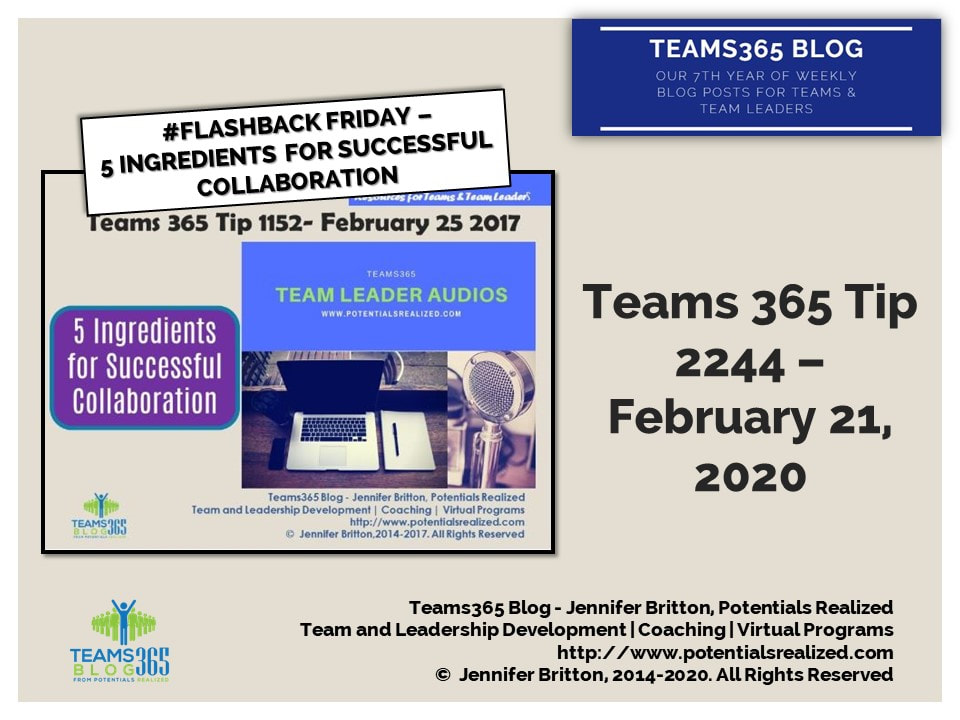What we know about great collaboration and great partnering is that a number of essential elements are in place. Typically partnering works best when we have a set of complimentary skills.
When partners are too similar, or teams are too similar we can create a lot of blind spots. We may have great bench strength in certain areas like the ability to execute results or to build relationships. And we may be missing certain skills that are essential, like strategic thinking.
That's great to drive for results, but if we're not clear on why we're driving for those results or if they're the best ones, then we may find ourselves in some challenges.
Another key principle in making collaboration work is making sure that we're leveraging people's strengths. As I have written many times here at the Teams365 blog, the research done by the Gallup organization points to that when teams that have the opportunity to use their strengths on a regular basis they are more productive and members generally have higher quality of life.
If you haven't had a chance to do any strength-based work with your teams, please reach out and contact me to discuss a Team Strengths Day. I use a number of strengths-based assessments in my work as a coach, as a trainer that can be brought into one-on-one conversations or work with your entire team.
The more we know ourselves, know what we're good at, and also know where we might find struggle, helps us be more effective. We can communicate that to others.
Teamwork is just like an orchestra. It’s not about being the best at everything, or even trying to. Teamwork is about making sure that we have the right people on the right instrument in the right seat, leveraging their strengths as best as possible.
As research has shown, it's much easier for us to do well in our strengths and to try to mitigate against our weaknesses.
Back to collaboration –two other factors really make it work well.
The third one is PLAN. Partnerships, great teams, great collaboration don’t just materialize. It happens with some planning. In my several of my books including Effective Virtual Conversations, I share more about the Arc of co-facilitation and some of the questions you can ask when you plan.
And number four, I wanted to mention which intentionality. So, as you go about your teamwork and or developing new partnerships, maybe you've been tasked with leading a new project. Maybe you've been tasked with pulling a group of experts together. Think about questions like how do we blend our skills or what do we each bring to the table?
Also, you want to make sure that you're feeling connected because we know that connection creates safety. Psychologically, if we think we are too different, it's very hard for teams in groups to move forward. So, a question around that might be getting people not to think about what they bring that’s unique, but also what is it that they bring that is similar.
In making teamwork and collaboration work take some time to get to know each other. Ask yourself questions around strengths and what's important, what will success look like for each of you as well as what will success look like for you collectively?
The fifth area I wanted to mention in terms of just getting or making collaboration, partnering really work is to make sure that you have deep levels of trust.
Trust is really the foundation of so many things. If we don't have trust, it's very hard to move into the deeper dialogue to feel that you are being supported, to know that someone has your back. Then in building trust, we want to undertake consistent actions that represent our intentions. We want to make sure that it's in proper alignment with where we're going, and we also want to make sure that we have things like transparency in place as well as feedback loops.
So just to quickly run through these five areas, again, things to think about as you're entering your partnerships, future projects, future collaborations.
- Number one, how do we bring complimentary skills to the table?
- Number two, what are our strengths and how do we leverage those?
- Number three, have we built in enough time for planning related to that?
- Number four, how intentional are we being?
- And finally, what are our levels of trust?
I hope that you'll check out some of our Teams365 blog posts related to this topic. Some of the most popular posts of months have included the six barriers to collaboration. Also check out making mentoring work virtually. Whether you are partnering with others face to face or in the virtual realm, in the same company or across the globe, these principles hold true.
Interested in learning more or want individual or team coaching support around this? Looking to have a virtual team day facilitated to do some work around strengths? Please reach out to me by email at [email protected] and let’s set up a conversation.
Enjoy your weekend!
Jennifer
Potentials Realized | Coaching Team Leaders | Remote Pathways Podcast
Team and Leadership Development | Coaching | Everything DiSC
Phone (416)996-8326
Get your planning on with the PlanDoTrack Workbook and Planner or Coaching Business Builder
Looking to enhance your virtual conversations? Webinars? Pick up a copy of Effective Virtual Conversations at Amazon.
Check out upcoming programs on our calendar!

 RSS Feed
RSS Feed





